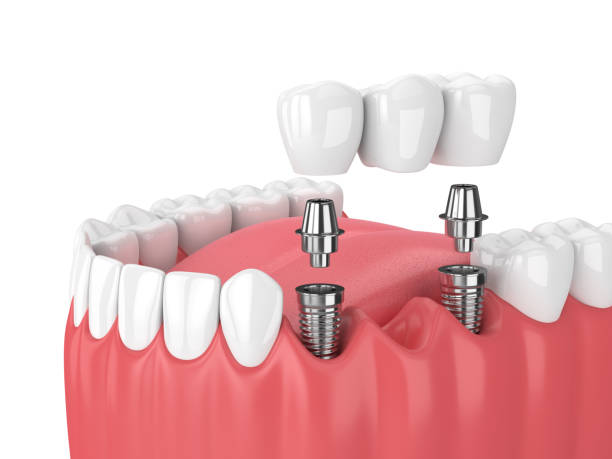Wanting to get Dental Bridges in near your?
Dental bridges are an excellent solution for replacing missing teeth, restoring your smile, and improving oral functionality. Whether you have a single missing tooth or multiple adjacent gaps, dental bridges can effectively bridge the spaces, providing a natural-looking and durable solution. By anchoring the bridge to adjacent healthy teeth or dental implants, you can regain your confidence and enjoy a complete, functional smile once again.
Consult with our experienced dental team to explore your options and discover the transformative benefits of dental bridges.
When do you need
Dental Bridges?
Dental bridges are needed in situations where you have one or more missing teeth and want to restore the appearance, functionality, and alignment of your smile. Dental bridges are recommended in the following scenarios:
- Missing Teeth
- Improved Chewing and Speaking
- Enhanced Smile Aesthetics
- Support for Facial Structure
- Dental Stability
Consulting with a dentist will help determine if dental bridges are the right solution for your specific dental needs and to discuss the best treatment plan for you.
FAQ
A dental bridge is a dental prosthesis used to replace one or more missing teeth by bridging the gap between two adjacent teeth. It consists of artificial teeth, known as pontics, which are held in place by dental crowns attached to the adjacent teeth on either side of the gap. The dental bridge restores the appearance, functionality, and alignment of the smile by filling the space left by the missing teeth. It provides a natural-looking and durable solution for tooth replacement, improving chewing ability, speech, and overall oral health.
Dental bridges offer several benefits for individuals with missing teeth. Some of the key advantages of dental bridges include:
- Restored Functionality: Dental bridges allow for improved chewing ability, making it easier to eat a variety of foods and maintain a balanced diet.
- Enhanced Appearance: Bridges fill the gaps left by missing teeth, restoring a complete smile and improving overall facial aesthetics. They can help boost self-confidence and self-esteem.
- Improved Speech: Missing teeth can affect speech clarity. Dental bridges help restore proper speech patterns, allowing for clearer and more confident communication.
- Maintained Dental Alignment: A gap caused by missing teeth can lead to shifting of surrounding teeth, causing misalignment. Dental bridges prevent neighboring teeth from moving and help maintain a proper bite and alignment.
- Preservation of Jawbone Health: When teeth are missing, the jawbone in that area may deteriorate over time. Dental bridges provide support to the jawbone, preventing bone loss and preserving its strength and density.
- Durability: Dental bridges are made from strong and durable materials, providing long-lasting results and withstanding normal biting and chewing forces.
- Non-Removable Solution: Unlike removable dentures, dental bridges are fixed in place and do not require removal for cleaning or maintenance.
It is important to consult with a dental professional to determine if dental bridges are the right option for your specific dental needs and to discuss the potential benefits in your particular case.
The dental bridge procedure typically involves multiple steps and requires multiple dental visits. Here is an overview of the general process:
- Initial Consultation: During the first visit, your dentist will examine your teeth, evaluate your oral health, and discuss the dental bridge treatment plan. X-rays or impressions may be taken to aid in planning.
- Tooth Preparation: In the next visit, the adjacent teeth that will support the dental bridge are prepared. This involves removing a small portion of enamel to make room for the dental crowns that will hold the bridge in place. An impression of your teeth is taken to create an accurate mold for the dental bridge.
- Temporary Bridge: While the final bridge is being fabricated in a dental laboratory, a temporary bridge may be placed to protect the exposed teeth and maintain functionality.
- Bridge Placement: In the subsequent visit, the temporary bridge is removed, and the custom-made permanent bridge is carefully checked for fit and aesthetics. Once approved, it is permanently cemented or bonded onto the supporting teeth.
- Final Adjustments: Your dentist will make any necessary adjustments to ensure a comfortable bite and proper alignment of the bridge with your natural teeth.
- Follow-up Visits: Additional follow-up visits may be scheduled to monitor the healing process and make any further adjustments, if needed.
Throughout the procedure, local anesthesia is typically used to minimize discomfort. Your dentist will provide specific instructions for post-treatment care and maintenance of your dental bridge.
It's important to note that the exact procedure may vary depending on individual cases and the specific type of dental bridge being used. Consulting with a dentist will provide you with personalized information regarding your dental bridge procedure.
The cost of a dental bridge can vary depending on several factors, including:
- Type of Bridge: Different types of dental bridges, such as traditional bridges, cantilever bridges, or implant-supported bridges, have varying costs.
- Materials Used: The materials used for the dental bridge, such as porcelain, ceramic, metal alloys, or a combination, can affect the cost.
- Number of Teeth: The number of missing teeth being replaced by the bridge will impact the cost. Bridges replacing more teeth tend to be more expensive.
- Additional Procedures: If any additional procedures, such as tooth extractions or dental implants, are required before placing the bridge, they can add to the overall cost.
- Geographic Location: The cost of dental bridges can vary based on the location and local market factors.
It's essential to consult with a dental professional for an accurate cost estimate specific to your case. They can evaluate your needs, discuss the various options available, and provide you with a detailed treatment plan and associated costs. Additionally, dental insurance coverage or dental discount plans may help offset some of the expenses.


